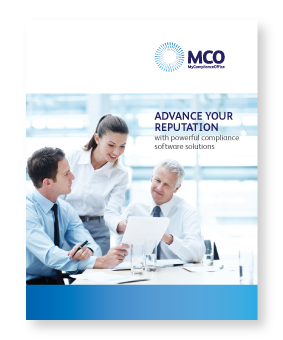Q&A
You can download a full copy of the slides from this webinar.
Interested in learning more about SMCR?
Download our whitepaper; 'Senior Managers and Certification Regime - How to Prepare Your Organisation'.
Full video transcript available below:
Welcome and thank you for joining today's webinar hosted by me, Joe Boyhan of MyComplianceOffice, and Gregory Brandman and Simon Collins of Eversheds Sutherland.
So the first one is, "Five to six years of references only required in respect of financial service roles?"
|
Yes, your obligation is really to provide reference, information, to firms within the regulated space, so the extent that, that is really the trigger that gives rise to the obligations that exist. It's with a view to someone seeking a role in the future within the regulated sector. It is obviously for the firm to take a view, if the individual was moving outside of regulated financial services, how they wish to deal with the nature of the reference. |
|
I think, I'm not an employment lawyer, but I would be surprised if there was no ongoing obligation that you would to do anymore, potentially create anymore legal risk for yourself in giving a pretty vanilla reference in the terms that historically has always been considered the correct approach. This individual worked at this organization between "x" and "y" date and that's about it. |
|
Okay. We have another question here. "How do those new regime affect a company's PI policy?" |
|
I don't, it's interesting. We've had conversations with insurers and brokers about this, and I think the view of the insurance industry is that it doesn't really affect that issue at all. Directors and officers, liability insurance for companies within the regulated space has been in existence for a number of years. The rules as we've seen are essentially restatement of rules that already applied. |
|
The increased exposure for senior managers is difficult to quantify in that context, but of course what you have is potentially, and this really is what goes to the risk. The rules, as far as banks are concerned, apply to a much greater population of staff. Now, again, while theoretically that gives a rise to a higher risk of claims. I can't really speak to what affect that's having on premiums, but I do understand it's not particularly significant. |
|
The question is what is the likelihood that the regulators will want to take individual enforcement action, for example, against a bank cashier for breeching a low-level conduct rule. They're focused and mindful that they have limited resources, going to remain very much on senior managers. |
|
If anything, the fraternity of individuals that the regulator will be taking action against has reduced. There are for fewer people holding regulatory approval under this new regime, then walk the case under APER because the certification function is swept up. The majority of those, particularly the CF30 holders. |
|
In short, on the basis of our conversations with insurers, we don't think it's had a material impact. |
|
Exactly. Okay, and we have a similar question here. "Are you expecting to see the code of conduct rules, like tier one level staff, enroll them to ALSAF?" |
|
That's a very- |
|
Sorry. "Rather not excluding a limited number of ancillary staff due to the additional administration of excluding rather than blanketing the mar-" |
|
Yes, and that's certainly been our experience with implementation to date. It's that they have sensibly tried to combine this regime with, for instance, perhaps a project around their own culture, a project around values, codes of ethics, this sort of thing, to actually then bring out the code of conduct for an [inaudible 01:00:31] conduct rule for all staff. |
|
Also, for instance, entrant staff, contractor stuff as well. Importantly, is anyone where the firm exercises some degree of supervision or control. That's certainly been our experience to date. Again, trying to keep pretty much a level playing field. |
| This webinar was co-hosted with Eversheds-Sutherland |


